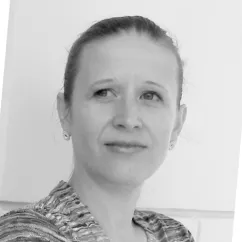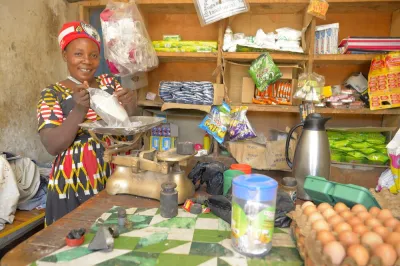Feeling the Social Finance Vibe in Europe and Central Asia

Katarzyna Pawlak is the new CEO of the Microfinance Centre (MFC), a network of microfinance institutions in Eastern Europe and Central Asia. MFC has 114 members and works to make financial services work for all people and communities, especially the underserved and excluded, by building on the achievements of the social finance sector: microfinance, financial cooperative systems and others.
FinDev Gateway: You recently became the CEO of the Microfinance Centre. Congratulations! You are taking this new position at an interesting time during a global pandemic. What do you see as the main challenges and opportunities you will face?
Katarzyna: Indeed, I am taking over the leadership from Grzegorz at a critical point for MFC and the sector. We have now gone through a few waves of the pandemic, and are still not sure how the situation will continue to evolve or what kind of new normal will result. Across the countries in Europe and Central Asia (ECA) where we have our members, the situation is quite varied in terms of access to vaccination and government policy measures. However, we do see some overall trends.
For one, COVID helped to greatly accelerate MFIs’ digital transformation, a process which MFC has been strongly supporting over the last few years, including through our flagship digitalization bootcamp. We will continue to support our members through this process, as we reorient many of our programs to focus even more on digital transformation through trainings, workshops and study tours.
At the same time, . As they make key decisions for their institution’s short and long-term survival, members look to us to help them identify important trends and visualize the future. So we need to provide a space where they can set their compass and inform themselves of current and future developments. Our upcoming MFC Annual Conference is one of the key ways we facilitate that kind of space.
There is no longer any question as to whether digital transformation is necessary. Many institutions sped up their digital transformation plans and the new processes which have resulted will become a permanent part of their operations.
FinDev: How are the MFIs in Europe and Central Asia doing in the context of the pandemic?
Katarzyna: Overall, the microfinance sector in ECA has been dealing pretty well with the pandemic and has displayed much greater resilience than the banking sector or microfinance in other regions. I believe this is due to the sector’s maturity, as it is composed mainly of established institutions which have had the opportunity to learn from a number of past crises.
At the start of the pandemic, MFC organized a series of COVID sessions to help members adapt to the situation. We observed that members were very proactive in reorienting operations to take control of the situation, and our follow-up research found that:
- European MFIs were much more affected by the COVID-19 crisis than were MFIs in Central Asia, where restrictions were shorter and often not so harsh.
- MFIs in Europe appear to have survived the impact of the pandemic relatively well, especially those which already had good, healthy systems and financial situations.
- Liquidity did not end up being a major sector problem, although there were institutions which had liquidity problems.
- The crisis showed that the sector is able to respond quickly to clients’ needs - e.g. through moratoria, grace periods and rescheduling - and stay in contact with them.
- Many institutions sped up their digital transformation plans and the new processes which have resulted will become a permanent part of their operations.
- Many institutions introduced remote work and reduced face-to-face meetings, including for some trainings.
- MFIs observe that regulation often does not keep up with the changes and can end up being a factor that slows down or stops further development.
FinDev: Apart from COVID, there has been a growing threat to the traditional microfinance model from digital providers. Are MFIs in your region adapting to the digital age? What challenges do they face as they do so?
Katarzyna: Digital transformation has progressed much more slowly in ECA than in other markets, because the markets here are very small and the population is older. With fewer young people to reach, MFIs have been challenged by the lack of digital literacy among traditional microfinance clients. Thus, digital providers have mainly entered the consumer lending area, and fintech development has not focused on traditional microfinance clients.
At the same time, the COVID-19 pandemic boosted customer use of online and digital channels, and of course there are still young people entering the market. MFIs in the region are aware that they need to diversify to digital solutions in order to capture this growing market, yet they still devote too little attention to the changes that are needed, seeing digital as an additional channel, not part of their core offering. However, there is an increasing number of MFIs which are fully committed to digitalization. Most are at the beginning of their digital transformation journey, so we will have to wait some time to see results.
FinDev: What will the inclusive finance sector in Europe look like ten years from now? Which types of MFIs are most likely to thrive? What kinds of services will be available to poor people?
Katarzyna: This is a very challenging question considering how fast things change and how easily we are all surprised by black swan type situations such as the pandemic. It will very much depend on how sector stakeholders adopt the latest technologies like Artificial Intelligence, Internet of Things, Blockchain, Open Banking Platforms with Application Program Interfaces (APIs), Robotic Process Automation (RAP), Augmented Reality and Virtual Reality. These are the drivers for the banking sector transformation in general, but most MFIs lag behind with digital transformation, not to mention adoption of these technologies. Nevertheless, we expect more digital/fintech organizations to enter the sector and believe that at some point in the future there will be international digital financial platforms dominating the market.
The sector will also change in line with the evolution of banking services in general towards invisible banking. This means that financial services will be fully integrated into clients’ economic lives, as processes and transactions become more and more automated. For example, an app will detect when a microenterprise’s supply is low and order supply on its own, analyzing and calculating the best options to optimize supply level and at the same time offering the microentrepreneur options for financing if needed.
With invisible banking, it will be less important what type of organization provides the service as opposed to what the service is and how seamlessly it is integrated into the economic lives of clients, their businesses and broader ecosystems. Service design will also be critical, and regulation will be needed to ensure inclusiveness, fair treatment and benefits for the user, as we have seen that technology can multiply human biases.
As they make key decisions for their institution’s short and long-term survival, members look to us to help them identify important trends and visualize the future. Our upcoming MFC Annual Conference provides a space where they can set their compass.
FinDev: Finally, you are hosting the annual conference for your members in September. How is it different from previous years? What can attendees look forward to?
Katarzyna: Social Finance Vibe 2021 is MFC’s 23rd annual conference, but the first of its kind! This year’s fully online edition will welcome over 1,000 participants and feature the biggest speaker line-up and networking space ever. For the first time it will be a fully free of charge event.
Over three days, we will explore the role of social finance actors in overcoming the pandemic crisis and advancing a green transition. We will welcome the region’s top leaders in social finance, key investors, service providers, thinktanks and associations – altogether 100+ expert professionals to share their insights on what’s next. Participants will have a chance to connect and engage with practitioners from Europe and Central Asia and beyond to do business and expand their networks.
The conference will also be a good place to inform the research work we have been undertaking on the pandemic’s impact on the sector, green finance and MFI transformation to new business models. I believe this encounter of our most important stakeholders in September will support MFC’s management and the newly elected MFC Council as we review our strategy this year and plan future activities.
Above all, we expect to reconnect after a long break, collectively create the vision for the sector going forward, and establish more collaboration within the broader social finance sector – not only microfinance but crowdfunding, impact investment, social enterprise support and alike.



Congratulations from the team at SPTF!
Leave a comment